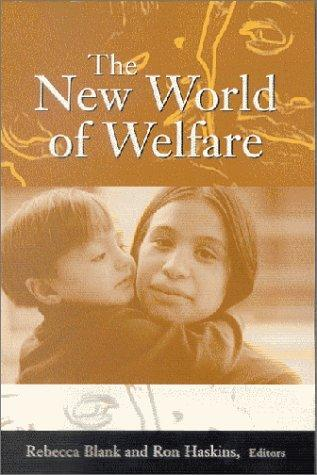Product desciption
The New World Of Welfare Rebecca Blank Ron Haskins by Rebecca Blank, Ron Haskins 0815710100, 9780815710103 instant download after payment.
Congress must reauthorize the sweeping 1996 welfare reform legislation by October 1, 2002. A number of issues that were prominent in the 1995-96 battle over welfare reform are likely to resurface in the debate over reauthorization. Among those issues are the five-year time limit, provisions to reduce out-of-wedlock births, the adequacy of child care funding, problems with Medicaid and food stamp receipt by working families, and work requirements. Funding levels are also certain to be controversial. Fiscal conservatives will try to lower grant spending levels, while states will seek to maintain them and gain additional discretion in the use of funds. Finally, a movement to encourage states to promote marriage among low-income families is already taking shape. The need for reauthorization presents an opportunity to assess what welfare reform has accomplished and what remains to be done. The New World of Welfare is an attempt to frame the policy debate for reauthorization, and to inform the policy discussion among the states and at the federal level, especially by drawing lessons from research on the effects of welfare reform. In the book, a diverse set of welfare experts —liberal and conservative, academic and nonacademic —engage in rigorous debate on topics ranging from work experience programs, to job availability, to child well-being, to family formation. In order to provide a comprehensive overview of the current state of research on welfare reform, the contributors cover subjects including work and wages, effects of reform on family income and poverty, the politics of conservative welfare reform, sanctions and time limits, financial work incentives for low-wage earners, the use of medicaid and food stamps, welfare-to-work, child support, child care, and welfare reform and immigration.Preparation of the volume was supported by funds from the Annie E. Casey Foundation and the Charles Stewart Mott Foundation. Contributors include Thomas L. Gais, Richard P. Nathan, and Irene Lurie (Rockefeller Inistitute, SUNY-Albany), Thomas Kaplan (University of Wisconsin), Lucie Schmidt (University of Michigan), Charles Murray (American Enterprise Institute), Hugh Heclo (George Mason University), Lawrence M. Mead (NYU), ), Julie Strawn, Mark Greenberg, and Steve Savner (Center for Law and Social Policy), Ladonna Pavetti (Mathematica Policy Research), Dan Bloom (Manpower Demonstration Research Corp.), Charles Michalopoulos and Gordon Berlin (Manpower Demonstraton Research Corporation), Jason A. Turner (Commissioner of Welfare, State of New York), Thomas Main (Baruch College of the City University of New York), Sheila Zedlewski and Pamela Loprest (Urban Institute), Robert Greenstein and Jocelyn Guyer (Center on Budget and Policy Priorities), George Borjas (Harvard University), Greg Duncan and Lindsay Chase-Landsdale (Northwestern University), Wade F. Horn (National Fatherhood Initiative), Isabel V. Sawhill (Brookings Institution, Irwin Garfinkel (Columbia University), Douglas Besharov and Nazanin Samari (American Enterprise Institute), Lynn A. Karoly, Jacob A. Klerman, and Jeannette A. Rogowski (RAND Corp.).


